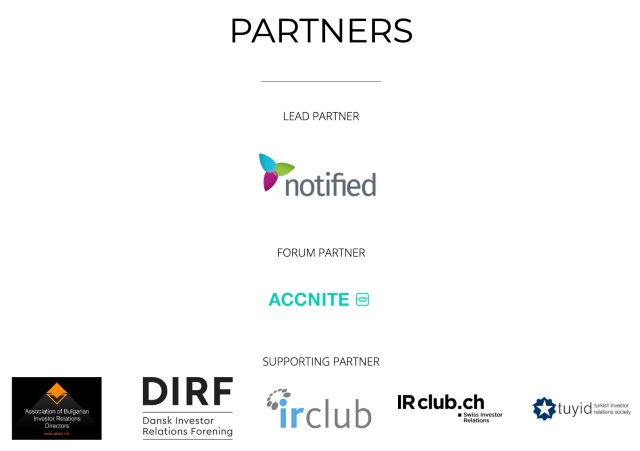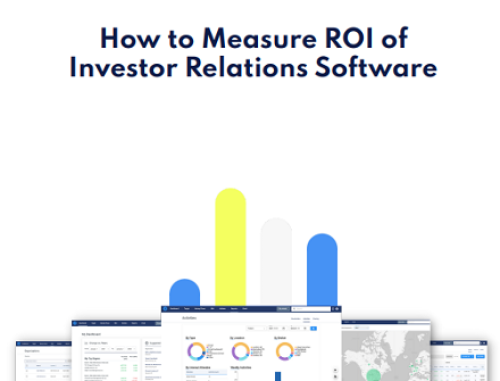While it’s more than a year since the explosion of interest in ChatGPT, IR practitioners, like most other professionals, remain unclear about exactly how AI technology will affect their industry, career and day-to-day job.
But there are clues: early use-cases are emerging, and the application of AI in other fields shows the potential direction of travel. These topics were put under the spotlight at the IR Magazine Forum – AI for IR, which took place in London on March 7.
The opening panel discussed where IR teams can get started with AI technology. ‘There’s the art of the possible, which I think we’re all excited about, which is: where can we be in one, two, three or five years?’ said Erik Carlson, COO & CFO at Notified. ‘Then there’s the practicality of where we are today. And I think there’s a pretty big gap in between.’
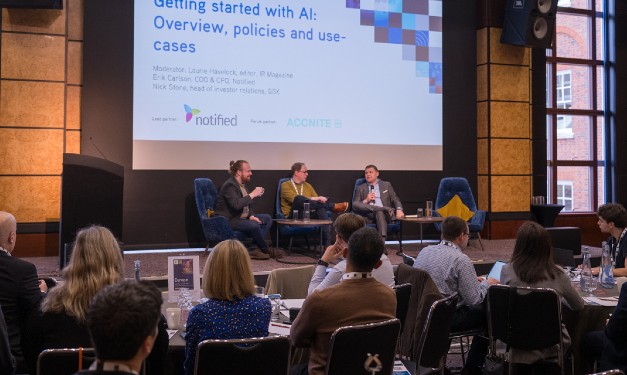
Carlson said existing use-cases are ‘pretty nascent’ and tend to focus on content synthesizing, such as distilling text into easily digestible chunks. But the possibilities of AI for IR go much further.
He said companies will be able to automate time-consuming tasks like report creation, freeing up more space for conversations with investors about the corporate narrative. ‘That’s the future, [but] I think we’ve got a long way to go,’ he said.
Nick Stone, head of IR at GSK, agreed that automation will be a key benefit that comes from adoption of AI. ‘How do I automate this world even more so that we can spend more time with the people who matter?’ he said.
He suggested IR teams start with easy-to-use tools, such as Grammarly. ‘We write every single day,’ he said. ‘To have AI oversight on how you write, checking your grammar – you can preload it with things such as style guides – is a really simple and tangible piece of technology that helps with that consistency of message and language.’
AI skills
The next panel focused on the skills and education IR teams will need to make sure they make the most of AI technology.
David Irish, IR and ESG senior manager at Vodafone, explained how he is keeping up with developments. He said patience was key, given that things will often not go right the first time you use new technology.
IROs also need to be curious and open to change, he added: ‘That’s particularly important for IR teams – we’re typically very small within large organizations and we don’t have the resources, know-how or scale to develop IR-specific AI tools, which means you need to be going out and speaking to suppliers.’
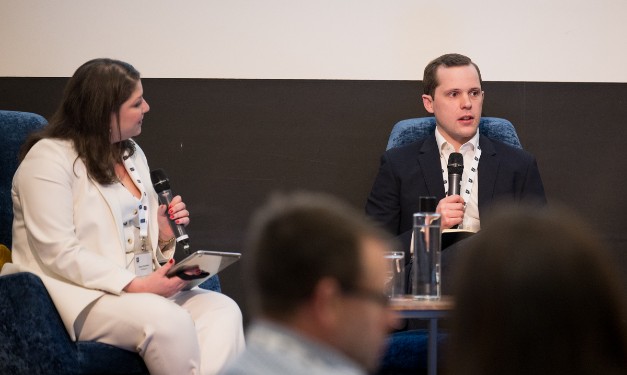
During the same panel, Irina Logutenkova, head of IR at Getech, offered advice on how to use prompt engineering to get the most out of AI tools, a process she described as ‘really tricky’.
‘I usually think like I am talking to a recent graduate or intern,’ she said. ‘I’m trying really patiently, in a clear way, to explain what I need in as much detail as I can to receive anything of value out of AI.’
Future applications
Following a coffee break, IR Magazine sat down for a fireside chat with Greg Secord, vice president of IR at OpenText, about AI and shareholder engagement. Secord was asked in what areas AI would be hard to implement for IROs but could potentially have the greatest benefit.
‘One is our intelligence on the market,’ he said. ‘Some of the market intelligence services and the exchanges have analytics tools and some AI tools in place already. Our ability to leverage those tools and become more of the stock performance expert in-house is going to be readily available.’
Secord also mentioned the potential for IR services to offer suggestions in real time during investor interactions. He referenced the billions of dollars being spent on customer support tools that offer tailored insights.
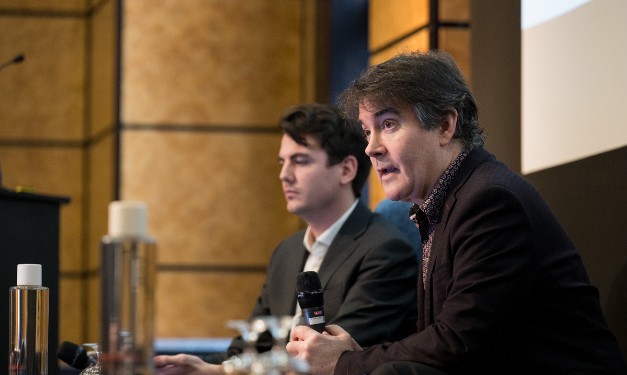
‘I think we will see very much the same thing from an IR perspective,’ he said. ‘We can see automation for retail, perhaps very hands-off. But for institutional investors, imagine tools where you’re on the phone with a fund manager and your conversation ventures somewhere, and the AI engine is listening to the call… and will actually, [in] real time, make suggestions based on the behavior of that account.’
Another area where AI could have a large impact, but is hard to implement, is investor targeting. Underlining this, an audience poll found 85 percent of respondents had not started using AI for targeting yet.
Some service providers are pushing ahead, however. Christian Bacherl, founder and managing partner at ACCNITE, explained how his firm is applying AI processes to uncover potential new shareholders for clients.
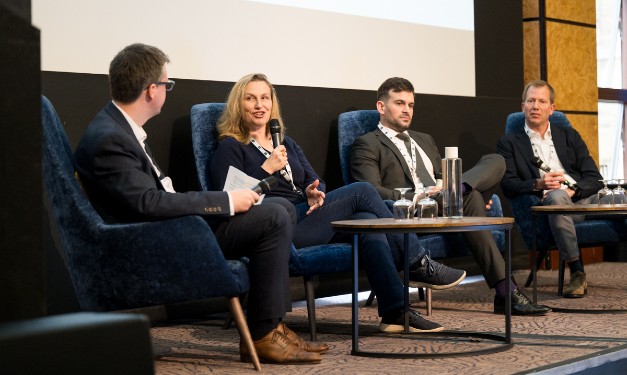
‘The models we are using are basically asking: what do the funds look like that currently hold your company?’ he said. ‘And then we go out and say: which funds are out there, which are similar to those holding you but aren’t currently invested?
‘There are other models we apply, where we feed additional elements of an investment story to the algorithms. It can be what’s driving the financial model or other features. And then they look for companies that are similar to that and are invested in those companies. You train the models and see what works. It’s a continuous improvement thesis.’
Buy-side insights
After lunch came an eagerly anticipated buy-side panel, featuring Harry Jack, head of pan-European equity research at Schroders, and Stefanie Mollin, global equities portfolio manager at GIB Asset Management.
‘We built some tools very quickly to help facilitate and speed up information extraction,’ said Jack. ‘We give our machine your annual report for the past few years, your sustainability report, an MSCI report, a Sustainalytics report, maybe a couple of sell-side reports, maybe our own internal research.
‘And with a lot of good prompt engineering, [we] have built a way to extract what we need from all those reports – very, very accurately now, much more accurately than an analyst. The analyst would probably have spent a day doing that work. And that could be done by the click of a button.’
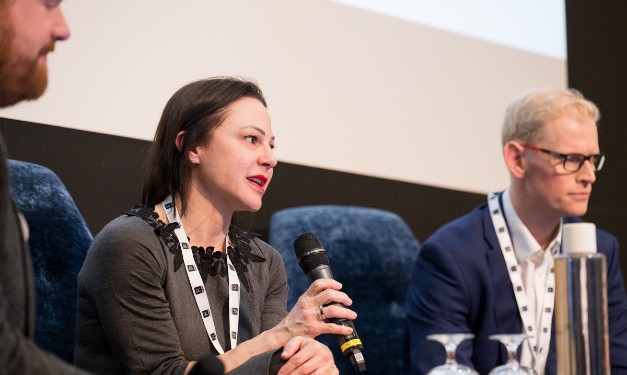
Mollin suggested that, given the way generative AI tools scrape the internet for simple explanations, companies should include a straightforward description of the investment thesis on the corporate site.
‘If you had on your website an investment case – I don’t know if everyone does it, but some companies do – [the AI] would probably take that information first,’ she said. ‘And that’s the message you want to give.’
Later came an interactive session, where attendees grouped together, analyzed an earnings release and then tried to guess what questions ChatGPT would suggest for the conference call.
The final session focused on AI and ESG. Alex Annaev, a sustainability expert and the creator of CSRD Chat, a tool that lets users ask questions about Europe’s Corporate Sustainability Reporting Directive, discussed the changing reporting landscape and how AI could help companies with incoming requirements.
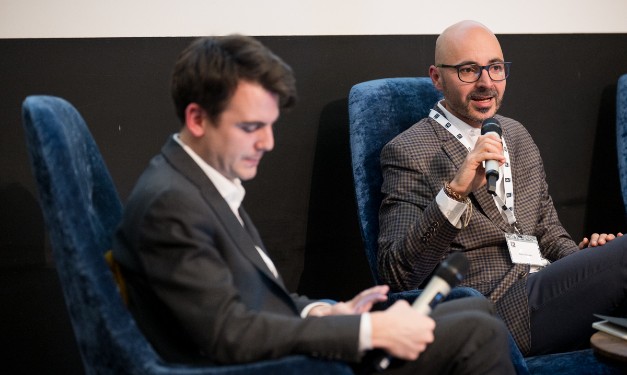
‘We are witnessing a big shift from more voluntary reporting to mandatory reporting,’ he said. ‘It’s going to be a massive burden for companies, but also an opportunity, because the intent is to harmonize reporting and make it more comprehensive.
‘It’s not happening yet, but I’m optimistic and hopeful that, with AI, we can achieve true interoperability between different standards, and make reporting easier so that companies can focus on driving sustainable change and engaging with investors, customers, employees and other stakeholders.’
To learn more about the IR Magazine Forum – AI for IR, please click here.
